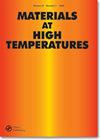Creep, fatigue and creep-fatigue behaviour of martensitic/bainitic steels and nickel-based alloys and their welded joints at the temperature range 500°C–750°C
IF 0.9
4区 材料科学
Q4 MATERIALS SCIENCE, MULTIDISCIPLINARY
引用次数: 0
Abstract
ABSTRACTThe aim of the paper is to investigate experimentally the fatigue and creep-fatigue material behaviour of improved materials and welded joints for the application in flexible future power plants. These materials promise a reduction in manufacturing costs as well as an increase in flexibility by providing enhanced creep strength thorugh a wall thickness reduction. At the temperature range between 500°C −550°C, the investigation focusses on the creep and low-cycle fatigue behaviour of dissimilar welded joints from conventional materials (bainitic and martensitic materials T24 and T92) to nickel-based alloys (A617B and HR6W) fabricated as tubes. At the temperature range between 700°C and 750°C, it focusses on the creep, low-cycle fatigue and creep-fatigue behaviour of similar and dissimilar welded joints from nickel-based alloys (A740H, A617B and A263) fabricated as tubes and as pipes. Metallographic investigations after testing provide support for understanding the influence of temperature, strain amplitude and dwell time on the microstructure change and the fatigue strength.KEYWORDS: Creepfatiguecreep-fatiguemartensitic/bainitic steelsnickel-based-alloyweld jointstubepipe Additional Notes to AuthorsDo you wish your paper to be submitted to Materials at High Temperatures … … … … … … Yes/NoThose papers accepted for inclusion in the MHT Journal will only appear in the conference proceedings as an abstract with reference to the full paper in the relevant edition of the Journal.An abstract book will be included within the delegate pack as below. You are invited to include a photo of the main author/presenter, to aid networking at the conference. If you prefer not to supply a photo we will happily include the abstract without a photo.Any questions relating to paper/presentation and submission to paper please contact the Chair of the Scientific Committee Dr Augusto Di Gianfrancesco, a.digianfrancesco@libero.it.Any questions relating to the organisation of the conference, registration or administration please contact the Chair of the Organising Committee Dr Peter Barnard, peter.barnard@mpiuk.comAcknowledgmentsThe results presented in this paper were generated within the European Research Project “Ni-based alloys for Operation of 725°C Power Plants, acronym NIBALO725“. This project has received funding from the Research Fund for Coal and Steel under grant agreement No. 709976. The authors thank the project consortium for the fruitful discussion during the project meetings, especially Special Metals for providing the A740H material (tube and pipe) and GE Power GmbH (former GE Boiler Deutschland GmbH) for the fabrication of the pipe and tube weldments.Disclosure statementNo potential conflict of interest was reported by the authors.Additional informationFundingThis work was supported by the Research Fund for Coal and Steel [709976].马氏体/贝氏体钢和镍基合金及其焊接接头在500℃- 750℃温度范围内的蠕变、疲劳和蠕变疲劳行为
摘要本文的目的是对未来柔性电站中应用的改进材料和焊接接头的疲劳和蠕变疲劳材料性能进行实验研究。这些材料有望降低制造成本,并通过减少壁厚提供增强的蠕变强度来增加灵活性。在500°C - 550°C的温度范围内,研究了从传统材料(贝氏体和马氏体材料T24和T92)到管状镍基合金(A617B和HR6W)的不同焊接接头的蠕变和低周疲劳行为。在700°C至750°C的温度范围内,重点研究了由镍基合金(A740H、A617B和A263)制成的管和管的相似和不同焊接接头的蠕变、低周疲劳和蠕变疲劳行为。试验后的金相研究为了解温度、应变幅值和停留时间对组织变化和疲劳强度的影响提供了支持。关键词:蠕变疲劳蠕变疲劳马氏体/贝氏体钢-镍基合金焊接接头作者补充说明您是否希望将您的论文提交给高温材料... ... ... ... ... ...是/否那些被纳入MHT期刊的论文将仅作为参考期刊相关版本全文的摘要出现在会议论文集中。一个摘要书将包括在委托包如下。我们邀请您附上主要作者/演讲者的照片,以帮助在会议上建立网络。如果您不愿意提供照片,我们将很高兴地包括没有照片的摘要。任何关于论文/演示和提交论文的问题请联系科学委员会主席auguto Di Gianfrancesco博士,a.digianfrancesco@libero.it.Any关于会议组织,注册或管理的问题请联系组织委员会主席Peter Barnard博士,peter.barnard@mpiuk.comAcknowledgmentsThe本文中提出的结果是在欧洲研究项目“用于725°C发电厂运行的镍基合金,缩写为NIBALO725”中产生的。本项目已获得煤炭和钢铁研究基金资助,资助协议号为709976。作者感谢项目联合体在项目会议期间进行的富有成果的讨论,特别是特种金属公司提供的A740H材料(管和管)和GE Power GmbH(原GE Boiler Deutschland GmbH)制造的管和管焊接件。披露声明作者未报告潜在的利益冲突。本研究得到了煤炭和钢铁研究基金[709976]的支持。
本文章由计算机程序翻译,如有差异,请以英文原文为准。
求助全文
约1分钟内获得全文
求助全文
来源期刊

Materials at High Temperatures
工程技术-材料科学:综合
CiteScore
1.90
自引率
15.40%
发文量
58
审稿时长
>12 weeks
期刊介绍:
Materials at High Temperatures welcomes contributions relating to high temperature applications in the energy generation, aerospace, chemical and process industries. The effects of high temperatures and extreme environments on the corrosion and oxidation, fatigue, creep, strength and wear of metallic alloys, ceramics, intermetallics, and refractory and composite materials relative to these industries are covered.
Papers on the modelling of behaviour and life prediction are also welcome, provided these are validated by experimental data and explicitly linked to actual or potential applications. Contributions addressing the needs of designers and engineers (e.g. standards and codes of practice) relative to the areas of interest of this journal also fall within the scope. The term ''high temperatures'' refers to the subsequent temperatures of application and not, for example, to those of processing itself.
Materials at High Temperatures publishes regular thematic issues on topics of current interest. Proposals for issues are welcomed; please contact one of the Editors with details.
 求助内容:
求助内容: 应助结果提醒方式:
应助结果提醒方式:


